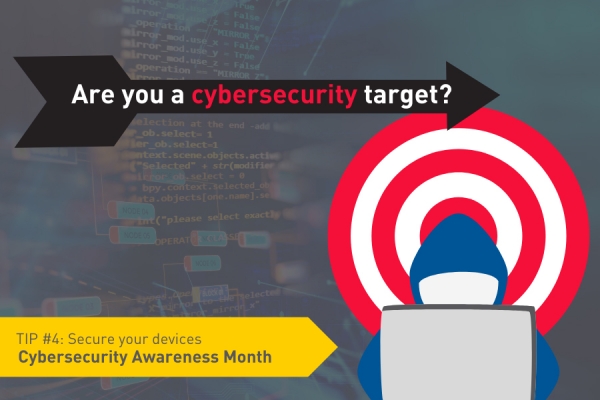 Take action now to secure your devices and protect your digital world.
Take action now to secure your devices and protect your digital world.
In today’s digital age, your electronic devices are vital to both your personal and professional life, making their security a top priority.
Avoid being a target and protect your electronic assets by following these recommended practices from Information Technology Services.
Each habit strengthens your defense against cyberthreats, and together, they form a robust shield.
- Close applications and browsers: At the end of your workday, close all applications and browser tabs to prevent potential vulnerabilities.
- Restart your computer regularly: Shutting down and restarting your computer at least once a week helps clear security threats and improves system performance.
- Enable automatic operating system updates: Automatic updates quickly address security vulnerabilities and keep your device running smoothly.
- Use the GlobalProtect VPN: Always connect securely with the University’s GlobalProtect Virtual Private Network, especially when off-campus.
- Maintain antivirus and firewall software: Keep your antivirus and firewall software up to date to ensure comprehensive protection.
- Update applications: Install Microsoft Office from portal.office.com and get apps only from trusted sources like Company Portal, Microsoft Store, or Mac App Store for regular updates.
- Subscribe to auto updates: Ensure your applications, including web browsers, are set to check for updates automatically.
- Install endpoint protection software: Use endpoint protection software like Cortex XDR and Windows Defender to shield your device from external viruses and malware. These tools scan for and remove potential threats.
For more detailed guidance, visit the Cybersecurity Computer Care webpage.
By registering your University-owned or personal devices in device administration, you contribute to protecting the campus network and data. This collective effort strengthens our defense against cyber threats, ensuring enhanced data protection and security.
When your computer or mobile phone is registered in device administration, it not only safeguards the University’s data but also provides seamless access to UWindsor systems for employees. Additionally, security fixes and patches are deployed directly to your device, improving its security posture.
Don’t wait until you’re a target — take action now to secure your devices and protect your digital world.
In early 2024, the University implemented mandatory cybersecurity training for all faculty, staff, post-doctoral fellows, adjunct professors, sessional instructors, and student employees. If you have not completed the mandatory training, do so by Oct. 31.
Led by IT Services, Cybersecurity Awareness Month efforts highlight cybersecurity issues relevant to the UWindsor community. More information can be found at uwindsor.ca/cybersecurity.
